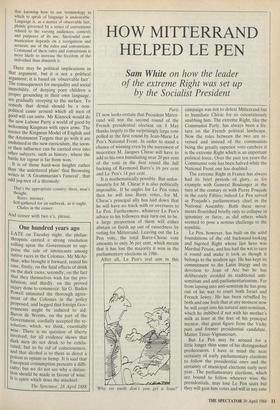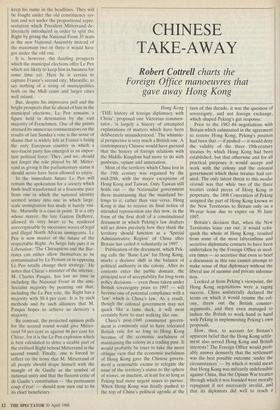HOW MITTERRAND HELPED LE PEN
Sam White on how the leader
of the extreme Right was set up by the Socialist President
Paris IT now looks certain that President Mitter- rand will win the second round of the French presidential election on 8 May thanks largely to the surprisingly large vote polled in the first round by Jean-Marie Le Pen's National Front. In order to stand a chance of winning even by the narrowest of majorities M. Jacques Chirac will have to add to his own humiliating near 20 per cent of the vote in the first round the full backing of Raymond Barre's 16 per cent and Le Pen's 14 per cent.
It is mathematically possible. But unfor- tunately for M. Chirac it is also politically impossible. If he angles for Le Pen votes then he will lose Barre votes, for M. Chirac's principal ally has laid down that he will have no truck with or overtures to Le Pen. Furthermore, whatever Le Pen's advice to his followers may turn out to be, a large proportion of them will either abstain or finish up out of cussedness by voting for Mitterrand. Leaving out the Le Pen vote, the total Barre-Chirac vote amounts to only 36 per cent, which means that it has lost the majority it won in the parliamentary elections in 1986. After all, Le Pen's real aim in this 'Why on earth don't you get a loan?' campaign was not to defeat Mitterrand but to humiliate Chirac for so ostentatiously snubbing him. The extreme Right, like the Communist Party, has always been a fix- ture on the French political landscape. Now the roles between the two are re- versed and instead of the communists being the greatly superior vote-catchers it is the extreme Right which is an important political force. Over the past ten years the, Communist vote has been halved while the National Front one has doubled.
The extreme Right in France has always had its brief periods of glory, as for example with General Boulanger at the turn of the century or with Pierre Poujade in the early Fifties; indeed Le Pen served as Poujade's parliamentary chief in the National Assembly. Both these move- ments flourished briefly only to collapse in ignominy or farce, as did others which seemed to pose a serious challenge to the republic. Le Pen, however, has built on the solid foundations of the old backward-looking and bigoted Right whose last hero was Marshal Petain, and has had the wit to turn it round and make it look as though it belongs to the modern age. He has kept its commitment to the Latin liturgy and its devotion to Joan of Arc but he has deliberately avoided its traditional anti- semitism and anti-parliamentarianism. Far from lapsing into anti-semitism he has gone out of his way to court both Israel and French Jewry. He has been rebuffed by both and one feels that at any moment now he will erupt into his natural anti-semitism, which he imbibed if not with his mother's milk at least at the feet of his principal mentor, that great figure from the Vichy past and former presidential candidate, Maitre Tixier-Vignancourt.
But Le Pen may be around for a little longer than some of his distinguished predecessors. I have in mind the near certainty of early parliamentary elections to follow the presidential ones and the certainty of municipal elections early next year. The parliamentary elections, which are bound to follow whoever wins the presidentials, may lose Le Pen seats but they will gain him votes and will in any case keep his name in the headlines. They will be fought under the old constituency sys- tem and not under the proportional repre- sentation which President Mitterrand de- liberately introduced in order to split the Right by giving the National Front 35 seats in the new National Assembly instead of the maximum two or three it would have got under the old one.
It is, however, the dazzling prospects which the municipal elections offer Le Pen which are likely to keep him in business for some time yet. Here he is certain to capture France's second city, Marseille, to say nothing of a string of municipalities both on the Midi coast and larger cities well inland.
But, despite his impressive poll and the bright prospects that lie ahead of him in the municipal elections, Le Pen remains a figure held in detestation by the vast majority of Frenchmen. One of the points stressed by numerous commentators on the results of last Sunday's vote is the sense of shame that is widely felt at France's being the only European country in which a neo-fascist party has emerged as an impor- tant political force. They, and we, should not forget the role played by M. Mitter- rand in giving it the parliamentary status it should never have been allowed to enjoy.
In the immediate future Le Pen will remain the spokesman for a society which finds itself transformed at a fearsome pace from one in which the national identity seemed secure into one in which large- scale immigration has made it barely visi- ble. Marseille is a case in point. It is a city whose mayor, the late Gaston Defferre, allowed its very heart to be rendered unrecognisable by successive waves of legal and illegal North African immigrants. Le Pen is now master of the future of the
respectable Right. As Serge July puts it in Liberation: 'The Chiraquiens and the Bar-
ristes can either allow themselves to be contaminated by Le Penism or in opposing Le Pen totally change their strategy.' He notes that Chirac's minister of the interior, M. Charles Pasqua, has lost no time in including the National Front in the anti- Socialist majority by pointing out that, including the Le Pen vote, the Right has a majority with 50.4 per cent. It is by such methods and by such alliances that M. Pasqua hopes to achieve so derisory a majority.
By contrast, the projected opinion polls for the second round would give Mitter- rand 54 per cent as against 46 per cent for Chirac, for it is the Le Pen explosion which is best calculated to drive a sizable part of the civilised Right behind Mitterrand in the second round. Finally, one is forced to reflect on the irony that M. Mitterrand of all people should drape himself with the mangle of de Gaulle as the symbol of national unity and that the fiercest critic of de Gaulle's constitution — 'the permanent coup d'etat' — should now turn out to be its chief beneficiary.



























































 Previous page
Previous page